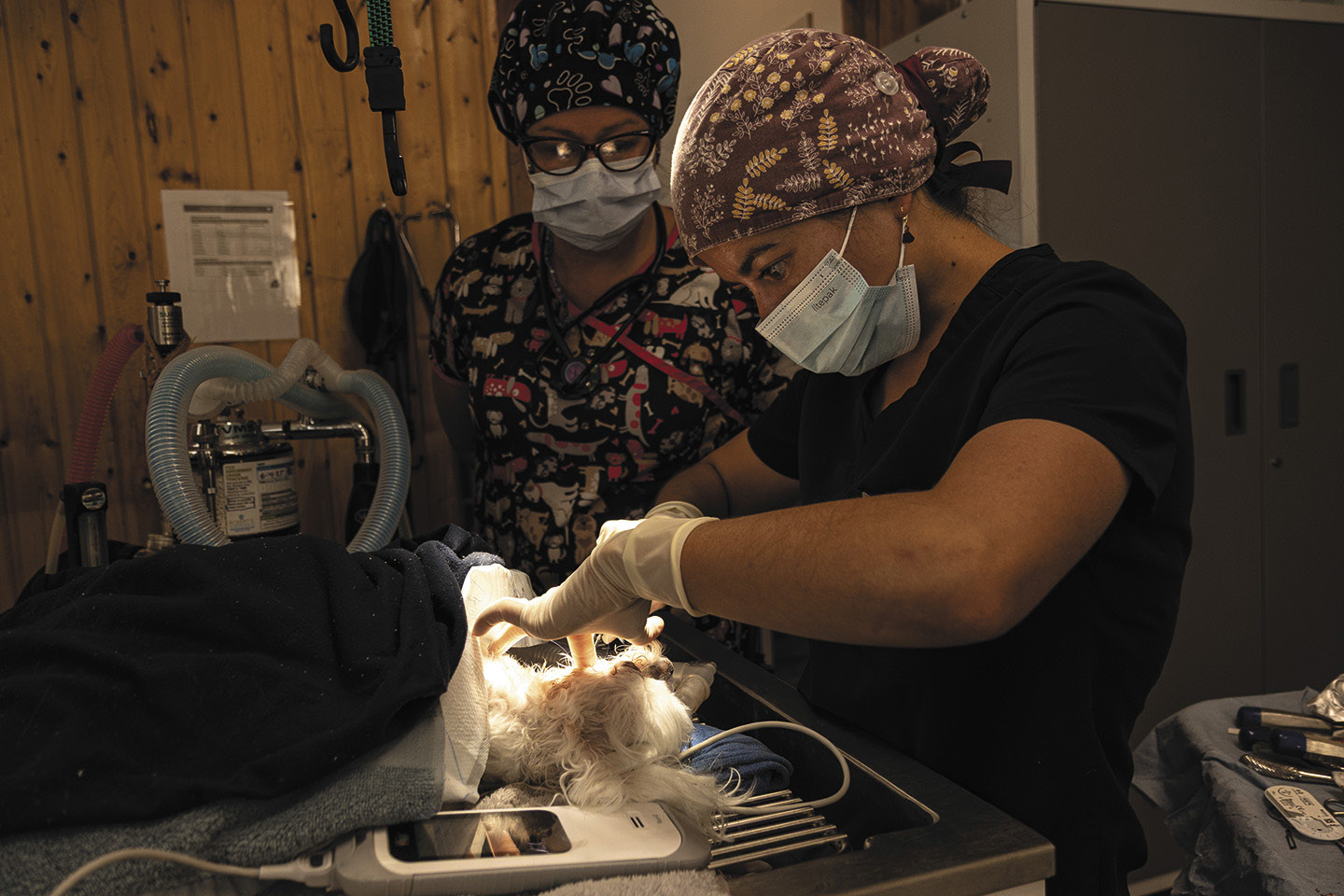Dr. Hannah Coenen didn’t know at first she wanted to be a veterinarian. She studied wildlife biology and spent a year working in wildlife rehabilitation before deciding on this career path.
But she did know, from an early age, that she cared about animals and their welfare.
One of the formative experiences leading her to this profession happened when she was a teenager, studying abroad in Ecuador. It wasn’t unusual to see stray dogs there. She remembers one dog the most – one she met in Santiago, Chile. There, she climbed a series of steps to an overlook, up hundreds of feet, and found an elderly dog lying at the top.
The dog had climbed the steps, too, and was stuck. Too arthritic to go back down, she was stranded. Coenen could tell she hadn’t eaten in a long time. She tried to pick up the dog, and the dog – frightened and in pain – tried to bite her.
Coenen descended the stairway, intent on finding someone to help her with the elderly dog. But she didn’t find anyone who could help her, and the language barrier didn’t help. She left, the memory of the dog haunting her.
“I thought, there’s got to be a way to help animals like this,” she said.
Now, her work is centered on treating animals and focusing on ways she can provide care and increase their quality of life, as Second Chance Humane Society’s new veterinarian. The nonprofit hired her as the resident veterinarian, allowing it to reopen the clinic to the public after more than a year of closure following the departure of its last vet.
The 30-year-old Coenen started in her position at the beginning of June, and she’s found she likes the combination of working with shelter animals as well as pets owned in the community. The goal is for her to spend 60% of her time serving shelter animals and 40% of the time on pets in the community.
Dr. Hannah Coenen
Photo courtesy Second Chance
Coenen came to Second Chance from her previous job at the largest shelter in Albuquerque, New Mexico, where she was accustomed to treating as many as 50 animals per day. The high volume of patients at that shelter included some with severe health needs, animals from reservations, pets of unhoused owners, and animals from households that didn’t have money to spare for their care. She also has experience with spay and neuter clinics to help reduce animal populations.
When she saw the opening for the Second Chance vet job, she decided to apply. Her partner had a new job as a geologist, based in Grand Junction. The couple found a home in Montrose, and she loaded up her two dogs – Hatch and Cheyenne – and a dog crate full of backyard chickens and made the move.
The Iowa native has lived in Colorado before. She completed her undergraduate education at Colorado State University, then returned to Iowa for her veterinary degree at Iowa State University, before completing an internship at the University of Florida.
“I honestly didn’t think I would ever live in Colorado again,” she said.
But after seeing the Western Slope, she realized there’s more to the Centennial state than the Interstate 25 corridor, and she was hooked by the open spaces, less-hectic traffic and outdoor recreation opportunities. She’s looking forward to backpacking, climbing and exploring the area more when she’s not working.
She’s also enjoying the chance to practice “incremental care,” a term used to describe a tiered approach to treatment. In this type of care, the veterinarian focuses on helping the pet owner understand and invest in the most critical care needed, and problem solving to allocate resources for the most critical procedures and the best outcomes.
Her job balances treatment of shelter animals with providing low-cost options for pet owners who want to be able to afford to keep their dogs and cats, who are part of their families.

Dr. Hannah Coenen performs dental work on a small dog at the Second Chance Humane Society clinic on Monday morning. Coenen started working as the nonprofit’s veterinarian in June, and Second Chance announced Aug. 12 the clinic is accepting appointments for pets in the community as well as treating its shelter animals, including spay/neuter services, vaccinations and euthanasia. Photo by Erin McIntyre | Ouray County Plaindealer
Her ability to treat the animals at Second Chance’s clinic serves not only the animals that are relinquished or found and taken to the shelter, but also pets owned by community members who don’t have a lot of money.
“I think the human-animal bond is just very precious,” she said. “It’s so important to be able to keep pets in their homes.”
Second Chance’s clinic is located at 177 County Road 10 in Ridgway. Clinic hours are by appointment, Monday through Thursday, from 8 a.m. to 5 p.m. Contact the clinic at 970-626-9713 or visit secondchancehumane.org for more information.

